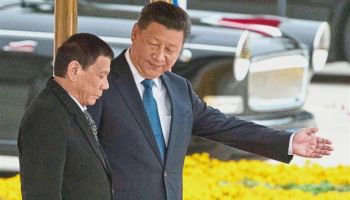 |
Li: ‘Malaysia must remember
that by targeting Chinese investors in an unreasonable way, this will
scare away not only FDI from China, but also from other countries.’ - credit: Malaysia Today
|
 |
| Great wall of controversy: Dr Mahathir’s
criticism of Alliance Steel’s barricade for its RM6bil integrated steel
complex has upset some Chinese investors. |
|
A series of attacks on China-funded projects in Malaysia by the Prime Minister is causing anxiety not only to Chinese nationals but also locals.
INVESTMENTS and mega contracts linked to China will have to brace for rocky times ahead if Prime Minister Tun Dr Mahathir Mohamad continues unchecked with his incessant tirade against Chinese endeavours in Malaysia.
The golden era for Chinese investments, which possibly peaked during the rule of former prime minister Datuk Seri Najib Razak, seems to have come to an unceremonious end.
The future of foreign direct investment (FDI) from China is now seen as unpredictable – at least for the next 3-5 years – under the new government of Dr Mahathir, according to Datuk Keith Li, president of China Entrepreneurs Association in Malaysia.
 |
| Li: ‘Malaysia must remember that by targeting Chinese investors in an
unreasonable way, this will scare away not only FDI from China, but also
from other countries.’ |
“The series of comments made on Chinese investments by the PM have affected the confidence of Chinese investors. Those who originally wanted to come are adopting a wait-and-see attitude, while those already in are careful about their expansion plans,” says Li in an interview with Sunday Star.
The outspoken leader of Chinese firms notes that businessmen from the mainland are “worried”, although some comments of the Prime Minister were later “clarified” by other Cabinet Ministers or the PM’s Office.
“Malaysia must remember that by targeting Chinese investors in an unreasonable way, this will scare away not only FDI from China, but also from other countries as well,” adds Li.
Since his five-day official visit to China that ended on Aug 21, the 93-year-old Malaysian leader has caused anxiety to all by making shocking announcements.
While summing up his China trip on Aug 21, he declared he would cancel the RM55bil East Coast Rail Link (ECRL) and two gas pipelines being built by Chinese firms.
As the ECRL is of strategic importance to China’s Belt and Road Initiative – the policy which Dr Mahathir has repeatedly voiced his support for, Beijing would expect a renegotiation of the contract terms rather than an outright cancellation.
Dr Mahathir had reasoned that with national debt of over RM1 trillion, Malaysia could not afford these projects. In addition, these contracts are tainted with unfair terms and smacked of high corruption.
Although the Prime Minister said Chinese leaders understood Malaysia’s situation, reactions of Chinese nationals on social media were unforgiving with many suspecting Dr Mahathir “has other motives”.
Many see Dr Mahathir as attempting to raise Malaysia’s bargaining power in the negotiation for compensation for the cancelled projects. China, according to social media talk, is asking for RMB50bil as compensation.
On social media, there are also suggestions that Dr Mahathir is aiming at his predecessor as most China-linked projects were launched during the rule of Najib.
During the rule of Najib, Malaysia-China relations were intimate.
This has resulted in the influx of major construction and property companies from the mainland, followed by banks and industries.
But on May 9, Dr Mahathir’s Pakatan Harapan coalition toppled the Barisan Nasional government of Najib after the most bitterly fought general election in local history.
The second-time premier has put the blame on Najib for the massive 1MDB financial scandal, which Najib has denied, and mismanagement of the country’s finance.
And while the Chinese nationals are all riled up by the cancellation of ECRL, Dr Mahathir came up with an ill-advised statement.
Last week he ordered a wall surrounding Alliance Steel, which is investing US$1.4bil (RM6bil) for a massive steel complex, to be demolished. This was seen as unreasonably targeting a genuine FDI.
Although the foreign ministry later clarified that the leader had mistaken the wall to be built around the Malaysia-China Kuantan Industrial Park (MCKIP), the anger of Chinese nationals lingers on.
The industrial park is a G-to-G project to jointly promote bilateral investments. There is an even bigger sister industrial park in China that houses many Malaysian firms. All these were built during Najib’s reign.
Dr Mahathir’s statement has also caught the attention of China’s Global Times, the mouthpiece of the Communist Party of China.
In an editorial on Aug 28, the news portal warned: “Many words of Kuala Lumpur can spread to China via the Internet, causing different reactions. How the Chinese public sees China-Malaysia cooperation is by no means inconsequential to Malaysia’s interests.”
It noted “while Dr Mahathir advocates pursuing a policy of expanding friendly cooperation with China ... but when it comes to specific China-funded projects, his remarks gave rise to confusion. Like this time, it is startling to equate the controversy surrounding a factory wall with state sovereignty.”
Global Times added: “When such remarks are heard by Chinese people, the latter find it piercing. They will definitely make Chinese investors worry about Malaysian public opinion and whether such an atmosphere will affect investment in the country.”
In fact, it would be unwise for the government to disrupt MCKIP. Co-owned by Chinese, IJM Corporation and Pahang government, this industrial park has lured in Chinese FDI of over RM20bil.
It is an important economic driver in the East Coast and has aimed to create 19,000 jobs by 2020.
While the “wall” statement might be seen as a minor mistake, Dr Mahathir’s flawed announcement last Monday that foreigners would be barred from buying residential units in the US$100bil (RM410bil) Forest City stirred another uproar.
On Aug 27, Reuters quoted Dr Mahathir as saying: “That city that is going to be built cannot be sold to foreigners. Our objection is because it was built for foreigners, not built for Malaysians. Most Malaysians are unable to buy those flats.”
Currently being developed by Country Garden Holdings of China, this 20-year long project, built on reclaimed land in Johor Bahru, aims to house 700,000 people. As about 70% of the house buyers are Chinese, some locals fear this could turn into a China town.
Unlike Alliance Steel that has stayed silent, Country Garden fought back by seeking clarifications from the PM’s Office.
In a statement, the major Chinese developer said all its property transactions had complied with Malaysian laws.
Citing Section 433B of the National Land Code, it added a foreign citizen or a foreign company may acquire land in Malaysia subject to the prior approval of the State Authority.
In addition, it said Dr Mahathir’s comment did not correspond with the content of the meeting he had with Country Garden founder and chairman Yeung Kwok Keung on Aug 16.
During the meeting, Dr Mahathir said he welcomed foreign investments which could create job opportunities, promote technology transfer and innovations.
In fact, this forest city project – along with ECRL – were the main targets of attack by Dr Mahathir before the May 9 election.
Opposition to these projects had helped drive Dr Mahathir’s election campaign, during which he said was evidence of Najib selling Malaysia’s sovereignty to China.
These projects, together with major construction contracts won by Chinese and the inflow of industrial investments, place the total value of Chinese deals at more than RM600bil in Malaysia.
But few would expect Dr Mahathir to use his powerful position to resume his attacks on China-linked projects so soon after his so-called “fruitful visit” to Beijing.
During his official visit to Beijing, the Malaysian leader was accorded the highest honour by China, due mainly to respect for “China’s old friend” and strong Malaysia-China relations built since 1975.
Dr Mahathir was chauffeured in Hongqi L5 limousine, reserved for the most honourable leaders, and greeted in an official welcome ceremony by Premier Li Keqiang. He was also guest of honour at a banquet at Diaoyutai State Guesthouse hosted by President Xi Jinping.
But beneath these glamorous receptions, there were reservations exuded by the Chinese for this leader whose premiership is scheduled to end in two years.
There were no exciting business deals signed in Beijing. There was absence of high diplomatic rhetoric that “Malaysia-China ties have been elevated to another historic high”, oft-repeated during Najib’s past visits.
Many even notice that Premier Li and Dr Mahathir had a cool handshake after their short joint press conference in Beijing.
And although China promised to buy Malaysian palm oil, the statement was qualified with “price sensitivity”, which means it will not buy above market price.
In addition, there was no mention of “buying palm oil without upper limit”, which was promised to Najib last year.
If Dr Mahathir’s original intention was to target Forest City and its owners, his move has certainly backfired. The country will have to pay a price for his off-the-cuff statement.
The “new policy” will have serious ramifications as it would hit the value of the properties not only in Forest City but also in other China-linked and non-Chinese projects.
Country Garden’s Danga Bay project will also be hit. It now faces a more daunting task of selling the balance of about 2,000 units in Danga Bay, according to a Starbiz report.
Other Chinese developers like R&F Princess Cove and Greenland Group will be affected.
VPC Alliance Malaysia managing director James Wong told Starbiz there may be legal suits against the government.
“That may force Country Garden to scale down because it has invested a lot with its industrial building systems factory and an international school, among other investments. It will impact Country Garden and Malaysia’s property sector negatively,” Wong said.
“Foreign buyers and other foreign companies will shy away,” Wong added.
The change in government and the insensitive comments on China-funded projects have turned Malaysia into a high-risk investment destination for the Chinese, according to Li.
“We don’t know which China projects will be targeted next. Looking back, it’s a blessing in disguise that we were pushed out of the RM200bil Bandar Malaysia project. It is also lucky that Chinese money has not gone into the RM30bil Melaka Gateway project,” says Li, who owns a travel agency in Malaysia.
“In the immediate future, more tourists from China are likely to shy away from Malaysia.
“Malaysia may not hit the target of having three million visits from China this year,” Li adds.
Credit: Ho Wah Foon The Star
Related posts:
Old politics: If the leadership keeps to the
racialist, feudalist and religious-centric tactics and policies of the
past, thinking this i...
Malaysia Bans Foreigners From Project
https://www.bloomberg.com/news/videos/2018-08-28/malaysia-bans-foreigners-from-project-video ..






















